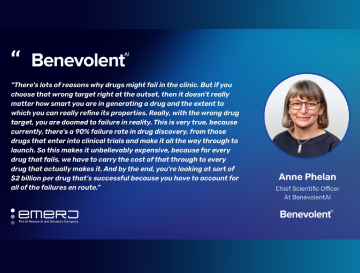Research published in Science Advances supports BenevolentAI’s AI-generated hypothesis from late January for baricitinib as a treatment for COVID-19.
The recent study, led by BenevolentAI’s scientific advisor, Professor Justin Stebbing, further illustrates the use of baricitinib to inhibit viral entry and demonstrates the drug’s better known anti-inflammatory effects. This research thereby supports the randomised clinical trials by the NIAID, notably ACTT-II and Eli Lilly’s placebo-controlled trial, COV-BARRIER, to test baricitinib’s efficacy in COVID-19 patients.
In summary, the study shows the safety and efficacy of baricitinib in the largest group of patients published thus far. Baricitinib was significantly associated with positive endpoints in a number of matched control analyses including reduced risk of death or tracheal intubation.
Notably, the study includes a cohort of over 100 patients from Spain with a median age of 81, with bilateral COVID-19 pneumonia. Although elderly people are at elevated risk of serious illness and death from the novel coronavirus, previous trials have been lacking in this demographic.
Linking this to the laboratory, using organotypic cultures of primary human liver cells, so-called organoids, the research showed that IFNalpha2 - a cytokine protein secreted by cells infected by the virus and acting on other cells to inhibit viral infection - increases ACE2 expression in the functional cells of the liver. Importantly, this cytokine-mediated ACE2 induction results in increased SARS-CoV-2 infectivity, which is fully inhibited by baricitinib. Additionally, in a world-first, using Oxford Nanoimager’s super-resolution microscopy images, the authors visualised the virus being inhibited from entering the lung cells.
Blood clots, large and small, are also a frequent complication of COVID-19, and this research helps to untangle why and how to stop them. Using RNA-Seq, the authors described genes associated with platelet activation induced by the virus, explaining the clots. This study then showed that baricitinib blocks the gene response signatures associated with blood clots.
Throughout the pandemic, unprecedented scientific innovation and collaboration have transcended national and organisational lines to help accelerate the global pandemic response. This research features among such notable feats of scientific collaboration, with a combination of over 50 authors, across 30 institutions and 10 countries.
This literature now sits alongside further encouraging proof-points for our AI-derived hypothesis, and we thank the global scientific community for their role in helping to advance research on this much-needed treatment option.
Back to blog post and videos




